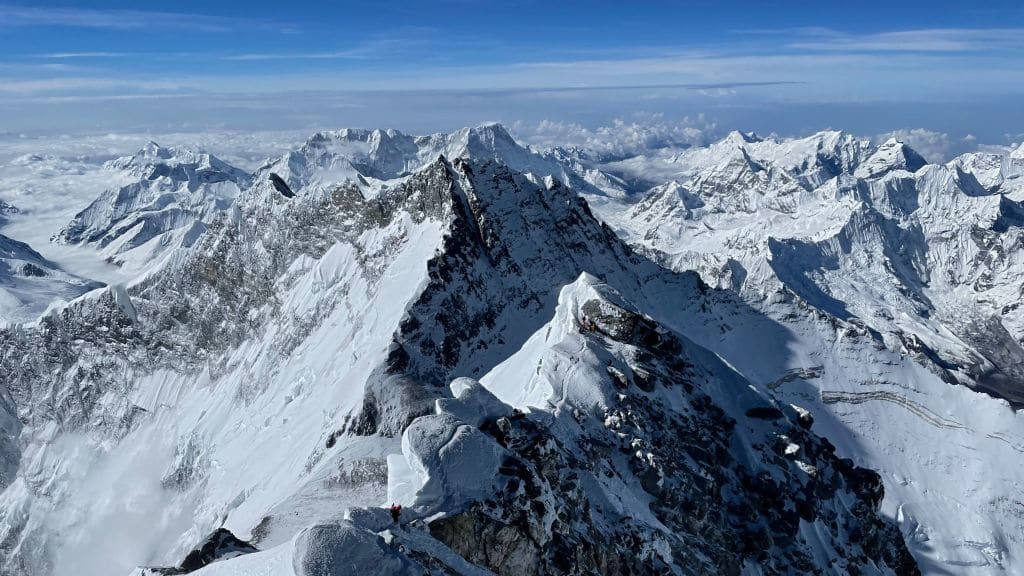Dozens of people with COVID-19 were likely on Mount Everest this climbing season


A free daily email with the biggest news stories of the day – and the best features from TheWeek.com
You are now subscribed
Your newsletter sign-up was successful
COVID-19 did what many climbers have been unable to do — the virus made it to the top of Mount Everest.
After speaking with Sherpa guides, expedition companies, and climbers, The New York Times estimates that by the end of climbing season in early June, at least 59 people infected with COVID-19 had been on Mount Everest. If you ask Nepal's tourism officials who oversee Everest expeditions, however, they say that no one with COVID-19 was ever on the mountain, explaining the illnesses away as pneumonia or coughing due to the dry air.
It's likely that Jangbu Sherpa, 38, was the first person with COVID-19 to reach the top of Mount Everest, the Times reports. He was hired to help a Bahraini prince climb the mountain, and in April, became sick at base camp. After his fever and cough got worse, the company that hired him airlifted Sherpa to a Kathmandu hospital, where he tested positive for coronavirus.
The Week
Escape your echo chamber. Get the facts behind the news, plus analysis from multiple perspectives.

Sign up for The Week's Free Newsletters
From our morning news briefing to a weekly Good News Newsletter, get the best of The Week delivered directly to your inbox.
From our morning news briefing to a weekly Good News Newsletter, get the best of The Week delivered directly to your inbox.
He spent nearly two weeks in the hospital and recovering at home, but returned to work because experienced guides were hard to find, and the expedition company did not want to lose thousands of dollars. Still fighting the virus, he led the prince and 15 others to the summit on May 11.
Nepal, one of the poorest countries in the world, depends on billions of tourism dollars from climbing and treks. Expeditions were called off in 2020 because of the pandemic, and Nepal needed the money this year, the Times reports. In Nepal, not even 3 percent of the population is fully vaccinated against COVID-19, and few Sherpas were inoculated when the climbing season began.
To climb, people had to test negative for the coronavirus, and there was more testing, mask wearing, and social distancing on the mountain. Still, people were becoming sick from the virus, and many were pressured to hide their infections, climbers and expedition companies told the Times. There were 408 foreign climbers this year, and almost half bowed out due to COVID-19 infections and snowstorms caused by a cyclone.
After four years of training, Mario Celinic of Croatia made it to Mount Everest then tested positive for COVID-19 at base camp. He told the Times he didn't have symptoms, so decided to still climb, likening Mount Everest to "a beautiful flower that will kill you anytime." Read more at The New York Times.
A free daily email with the biggest news stories of the day – and the best features from TheWeek.com
Catherine Garcia has worked as a senior writer at The Week since 2014. Her writing and reporting have appeared in Entertainment Weekly, The New York Times, Wirecutter, NBC News and "The Book of Jezebel," among others. She's a graduate of the University of Redlands and the Columbia University Graduate School of Journalism.
-
 The week’s best photos
The week’s best photosIn Pictures An Andean god, a rogue squirrel, and more
-
 ‘Zero trimester’ influencers believe a healthy pregnancy is a choice
‘Zero trimester’ influencers believe a healthy pregnancy is a choiceThe Explainer Is prepping during the preconception period the answer for hopeful couples?
-
 AI surgical tools might be injuring patients
AI surgical tools might be injuring patientsUnder the Radar More than 1,300 AI-assisted medical devices have FDA approval
-
 Epstein files topple law CEO, roil UK government
Epstein files topple law CEO, roil UK governmentSpeed Read Peter Mandelson, Britain’s former ambassador to the US, is caught up in the scandal
-
 Iran and US prepare to meet after skirmishes
Iran and US prepare to meet after skirmishesSpeed Read The incident comes amid heightened tensions in the Middle East
-
 EU and India clinch trade pact amid US tariff war
EU and India clinch trade pact amid US tariff warSpeed Read The agreement will slash tariffs on most goods over the next decade
-
 Israel retrieves final hostage’s body from Gaza
Israel retrieves final hostage’s body from GazaSpeed Read The 24-year-old police officer was killed during the initial Hamas attack
-
 China’s Xi targets top general in growing purge
China’s Xi targets top general in growing purgeSpeed Read Zhang Youxia is being investigated over ‘grave violations’ of the law
-
 Panama and Canada are negotiating over a crucial copper mine
Panama and Canada are negotiating over a crucial copper mineIn the Spotlight Panama is set to make a final decision on the mine this summer
-
 Why Greenland’s natural resources are nearly impossible to mine
Why Greenland’s natural resources are nearly impossible to mineThe Explainer The country’s natural landscape makes the task extremely difficult
-
 Iran cuts internet as protests escalate
Iran cuts internet as protests escalateSpeed Reada Government buildings across the country have been set on fire
